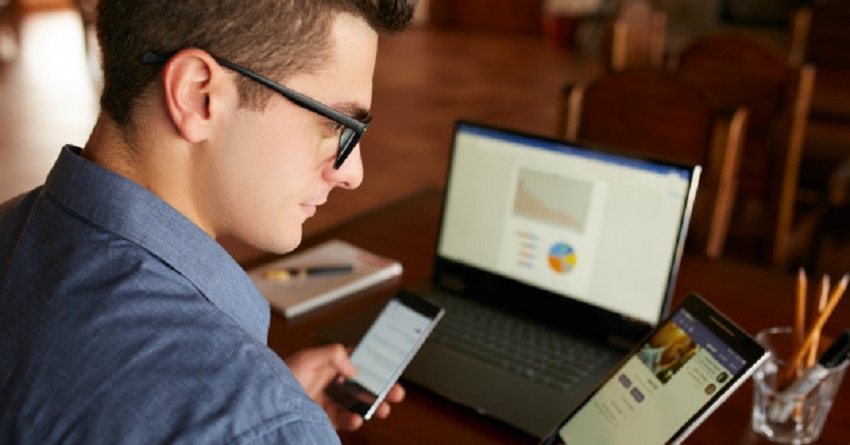
10 Jun Three Things You Shouldn’t Do on a Work-Issued Device
These days, employers provide their employees with a variety of devices from which to complete their work, from smartphones to laptops and even tablets. If you’ve been provided with an employer-issued device, your company’s IT department will usually set up login information for you, along with a selection of important apps that you’ll need to complete your daily work tasks, and anything else necessary for you to successfully do your job. After a while, you might want to start adjusting the device slightly to suit your own preferences, such as uploading a screen saver from your personal photographs, logging into your Spotify account and checking social media now and then. However, cybersecurity experts advise against combining your personal and professional lives into one device; nearly two-thirds of IT professionals believe that several high-profile breaches were caused by careless employees, who may not have even realized the impact of their actions. So, here are some things that you should never do on a work-issued device.
#1. Save Personal Passwords in the Keychain:
Most of us are using our work device for at least eight hours of the day; some employees can even take work laptops or smartphones home with them, which quickly turns them into their main device. Often, our work devices can end up being used more often than our personal ones, so it’s all too easy to click ‘save password’ when the option is given, but this should be avoided. Many companies have a clause in their computer, internet and email use policy that prohibits storing personal passwords, so double check before you click save.
#2. Access Public Free Wi-Fi:
This is particularly important if you’re working on anything that contains sensitive information. It can be nice to get out of the office and complete your work at a local coffee shop instead, but if you’re going to be working on something that you wouldn’t want anybody else to get hold of, it’s best to see if you can connect to a personal hotspot or dongle rather than using the free, public Wi-Fi on offer. You should be especially careful not to access your email, banking or credit card accounts when on a free Wi-Fi network, too – there’s a risk that hackers have set up a fake network that seems just like the real thing, but isn’t.
#3. Use Your Work Device for a Side Hustle:
If you’re working on a side hustle as well as your regular job and you can take your devices home, it can be tempting to just continue working on that device whenever you’re doing the work that you have on the side. However, bear in mind that everything that you do on your work device can be recorded, legally, by your employer, so it’s a wise idea to check with them first whether they are OK with you using the device for anything else – otherwise, they may end up using misconduct forensics for employees to pull your data, and you could find yourself in serious trouble.
Many workplaces provide their employees with devices, but it’s important to know the dos and don’ts of using a company device.


